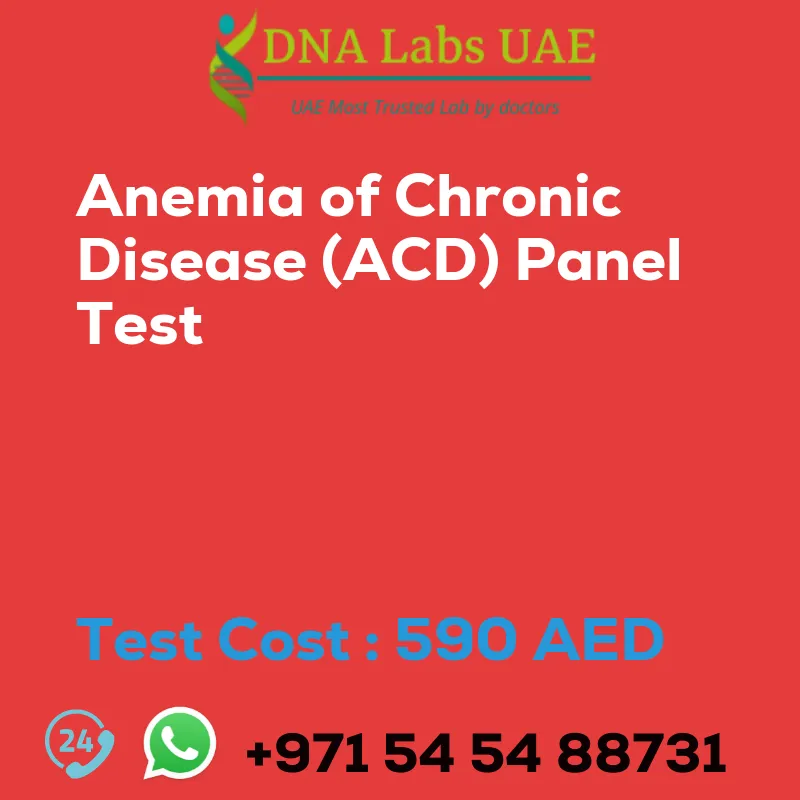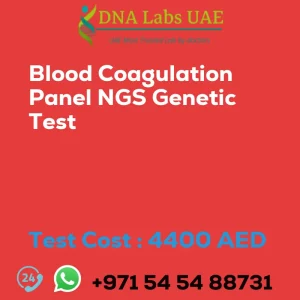ANEMIA OF CHRONIC DISEASE ACD PANEL Test
At DNA Labs UAE, we offer the ANEMIA OF CHRONIC DISEASE ACD PANEL Test to help diagnose the cause of anemia in patients with chronic diseases. This test is essential for individuals experiencing anemia due to chronic inflammation or infection, autoimmune disorders, or certain types of cancer.
Test Components
- Serum Iron studies
- CBC
- Ferritin
- sTfR
- sTfR Index
- CRP
Test Cost
The cost of the ANEMIA OF CHRONIC DISEASE ACD PANEL Test is AED 590.0.
Symptoms and Diagnosis
Common symptoms of anemia of chronic disease (ACD) include fatigue, weakness, pale skin, and shortness of breath. To diagnose ACD, our expert hematologists use the following tests:
1. Complete Blood Count (CBC)
The CBC measures the levels of red blood cells, white blood cells, and platelets in the blood. In ACD, the CBC may show a low red blood cell count (anemia), normal or low white blood cell count, and normal or low platelet count.
2. Serum Iron
This test measures the amount of iron in the blood. In ACD, the serum iron levels are usually normal or high, indicating that iron is not the cause of the anemia.
3. Total Iron-Binding Capacity (TIBC)
The TIBC test measures the amount of transferrin, a protein that transports iron, available in the blood. In ACD, the TIBC levels are usually low, indicating that the body is unable to transport iron effectively.
4. Ferritin
This test measures the levels of ferritin, a protein that stores iron, in the blood. In ACD, the ferritin levels are usually normal or high, indicating that iron is being stored but not utilized effectively.
5. C-Reactive Protein (CRP)
The CRP test measures the levels of CRP, a marker of inflammation, in the blood. In ACD, the CRP levels are usually elevated, indicating the presence of chronic inflammation.
6. Erythrocyte Sedimentation Rate (ESR)
The ESR test measures the rate at which red blood cells settle at the bottom of a test tube. In ACD, the ESR is usually elevated, indicating the presence of inflammation.
By analyzing the results of these tests, our healthcare providers can determine if the anemia is due to chronic disease and inflammation rather than other causes, such as iron deficiency or vitamin deficiencies. This information helps guide further diagnostic investigations and treatment options for the patient.
Sample Condition
To ensure accurate results, we require a 3 mL (1.5 mL minimum) serum from 1 SST and 3 mL (2 mL minimum) whole blood in 1 Lavender Top (EDTA) tube. The samples should be shipped refrigerated and should not be frozen. Overnight fasting and sampling before 12 noon is preferred. Please avoid iron supplements for a minimum of 24 hours prior to specimen collection.
Report Delivery
Sample collection is done on Monday and Thursday before 9 am. The report will be delivered on the same day.
Method
The ANEMIA OF CHRONIC DISEASE ACD PANEL Test is performed using various methods including spectrophotometry, electrical impedance, VCS, nephelometry, chemiluminescent immunoassay, and immunoturbidimetry. These methods ensure accurate and reliable results.
Test Type
The ANEMIA OF CHRONIC DISEASE ACD PANEL Test falls under the category of anemia tests. It is specifically designed to diagnose anemia caused by chronic diseases.
Doctor
The ANEMIA OF CHRONIC DISEASE ACD PANEL Test is conducted and analyzed by our experienced hematologists who specialize in diagnosing and treating blood disorders.
Test Department
The ANEMIA OF CHRONIC DISEASE ACD PANEL Test is conducted in our specialized Test Department, ensuring accurate and reliable results.
Pre Test Information
For optimal results, we recommend overnight fasting and sampling before 12 noon. Please avoid iron supplements for a minimum of 24 hours prior to specimen collection.
Don’t let anemia of chronic disease go undiagnosed. Contact DNA Labs UAE today to schedule the ANEMIA OF CHRONIC DISEASE ACD PANEL Test and get the answers you need for effective treatment.
| Test Name | ANEMIA OF CHRONIC DISEASE ACD PANEL Test |
|---|---|
| Components | *Serum Iron studies *CBC *Ferritin *sTfR *sTfR Index *CRP |
| Price | 590.0 AED |
| Sample Condition | 3 mL (1.5 mL min ) serum from 1 SST AND 3 mL (2 mL min.) whole blood in 1 Lavender Top (EDTA) tube. Ship refrigerated. DO NOT FREEZE.Overnight fasting & sampling before 12 noon is preferred. Avoid iron supplements for minimum 24 hours prior to specimen collection. |
| Report Delivery | SampleMon / Thu by 9 am; Report Same day |
| Method | Spectrophotometry, Electrical Impedence, VCS, Nephelometry , Chemiluminescent Immunoassay,Immunoturbidimetry |
| Test type | Anemia |
| Doctor | Hematologist |
| Test Department: | |
| Pre Test Information | Overnight fasting & sampling before 12 noon is preferred. Avoid iron supplements for minimum 24 hours prior to specimen collection. |
| Test Details |
The Anemia of Chronic Disease (ACD) Panel test is a diagnostic tool used to determine the cause of anemia in patients with chronic diseases. ACD is a type of anemia that occurs as a result of chronic inflammation or infection, autoimmune disorders, or certain types of cancer. The ACD Panel test typically includes the following blood tests: 1. Complete Blood Count (CBC): This test measures the levels of red blood cells, white blood cells, and platelets in the blood. In ACD, the CBC may show low red blood cell count (anemia), normal or low white blood cell count, and normal or low platelet count. 2. Serum Iron: This test measures the amount of iron in the blood. In ACD, the serum iron levels are usually normal or high, indicating that iron is not the cause of the anemia. 3. Total Iron-Binding Capacity (TIBC): This test measures the amount of transferrin (a protein that transports iron) available in the blood. In ACD, the TIBC levels are usually low, indicating that the body is unable to transport iron effectively. 4. Ferritin: This test measures the levels of ferritin, a protein that stores iron, in the blood. In ACD, the ferritin levels are usually normal or high, indicating that iron is being stored but not utilized effectively. 5. C-Reactive Protein (CRP): This test measures the levels of CRP, a marker of inflammation, in the blood. In ACD, the CRP levels are usually elevated, indicating the presence of chronic inflammation. 6. Erythrocyte Sedimentation Rate (ESR): This test measures the rate at which red blood cells settle at the bottom of a test tube. In ACD, the ESR is usually elevated, indicating the presence of inflammation. By analyzing the results of these tests, healthcare providers can determine if the anemia is due to chronic disease and inflammation rather than other causes, such as iron deficiency or vitamin deficiencies. This information helps guide further diagnostic investigations and treatment options for the patient. |







